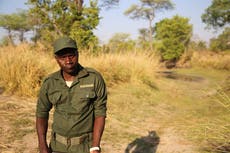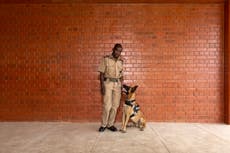We’re only as strong as our weakest health system. We must invest in animals to prevent another pandemic
Stop the Illegal Wildlife Trade: 1.3bn people depend on healthy animals for their livelihood, yet access to animal health systems is poor or non-existent in many areas

As the UK moves into another national lockdown, sadly one thing we can confidently say about the Covid-19 pandemic was that it was predictable. Many anticipated that a pathogen would spill over from animals into humans to cause a global pandemic, and it could happen again.
To stop it, we must invest in vets and veterinary supplies whilst properly monitoring animal disease. We are only as strong as our weakest health system, and that is the animal health system.
At the G20 in November 2020 The Independent and the WC20 coalition of conservation organisations launched a declaration to call for the control of the illegal wildlife trade. This initiative to build back better will also depend on well-equipped and well-trained vets to succeed.
We need them because it will be veterinary officials at the borders checking consignments. It is animal health surveillance systems and laboratories that test the samples from wildlife and it is vets advising on policy at a national and international level.
With animals and humans living and working increasingly closer together, pandemic disease should be at the top of every national and organisational risk register with a corresponding level of investment made to prevent the next outbreak.
Despite this, there has been little investment in veterinary services and veterinary public health particularly in low- and middle- income countries. This increases the risk of not only devastating animal disease outbreaks such as African Swine Fever but also human pandemics such as Covid-19 and other zoonotic diseases that hinder the potential of individuals, communities, and whole nations.
Stop the Illegal Wildlife Trade
We are working with conservation charity Space for Giants to protect wildlife at risk from poachers due to the conservation funding crisis caused by Covid-19. Help is desperately needed to support wildlife rangers, local communities and law enforcement personnel to prevent wildlife crime. Donate to help Stop the Illegal Wildlife Trade HERE
A study in 2012 funded by the Department of International Development and led by the International Livestock Research Institute found 56 zoonoses (diseases that can jump from animals to humans) that together were responsible for 2.5 billion cases of human illness and 2.7 million deaths a year.
The World Organisation for Animal Health (OIE), the animal equivalent of the World Health Organisation, has said: “Livestock and Veterinary Services are chronically under-resourced against all comparative measures. Poor financial resources and inadequately staffed and organised Veterinary Services results in high livestock losses and uncontrolled epidemics.”
It is striking that the annual budget of the World Organisation for Animal Health is less than 1 per cent of that of the World Health Organisation.
Across most of Africa, South Asia, and Latin America, communities who depend on livestock for nutrition, water, income, or transportation do not have access to veterinary services. 1.3 billion people (one in five of the worlds population) depend on healthy animals for their livelihood and yet access to animal health systems is poor or non-existent in many areas.
To prevent future global health crises, first of all we need to train more vets and veterinary paraprofessionals, who, in the absence of trained vets provide basic animal health care and advice to communities.
There simply aren’t enough people part of this vital workforce. These professionals are at the frontline of the fight against zoonotic disease through prevention, diagnosis, treatment, and surveillance.
At Brooke, we have trained over 5,000 animal health professionals through our animal health mentoring framework, which is a significant achievement, but initiatives like this need to be scaled up with other organisations rolling out the framework.
Secondly, we need to establish a list of essential veterinary medicines and vaccines equivalent to that for human health care. Access to and the quality of these essential veterinary medicines needs to be monitored to ensure that animal health professionals are able to treat and vaccinate animals to maintain high standards of health.
Vaccines also prevent zoonotic diseases, such as rabies, from infecting humans. One person dies every nine minutes from rabies: 40% of whom are children living in Asia and Africa. This would not happen if dogs were vaccinated.
Thirdly, we need to support laboratories and veterinary public health institutions in their surveillance efforts. Laboratories need facilities, and training. By better monitoring animal diseases, including that within wildlife, we can prevent their spread to humans.
Action for Animal Health is a coalition of multi-lateral, non-governmental and academic organisations that aims to secure greater support for animal health systems. Following a launch at the United Nations momentum is growing for sustained attention and investment in animal health and welfare at a global level.
Clearly there is a lot to be done, but now more than ever, the health of our species and our planet requires us to recognise the complex, interdependent relationships we have with the animals that we depend on for our food, livelihoods, and well-being.
The COVID-19 crisis, together with existing disease and the interdependence between humans and animals mean that investment in animal health systems must be prioritised.
Dr Klara Saville is Head of Global Animal Health, Welfare and Community Development at Brooke, an international charity that protects horses, donkeys and mules and supports people in the developing world to work their way out of poverty
Join our commenting forum
Join thought-provoking conversations, follow other Independent readers and see their replies
Comments




Bookmark popover
Removed from bookmarks